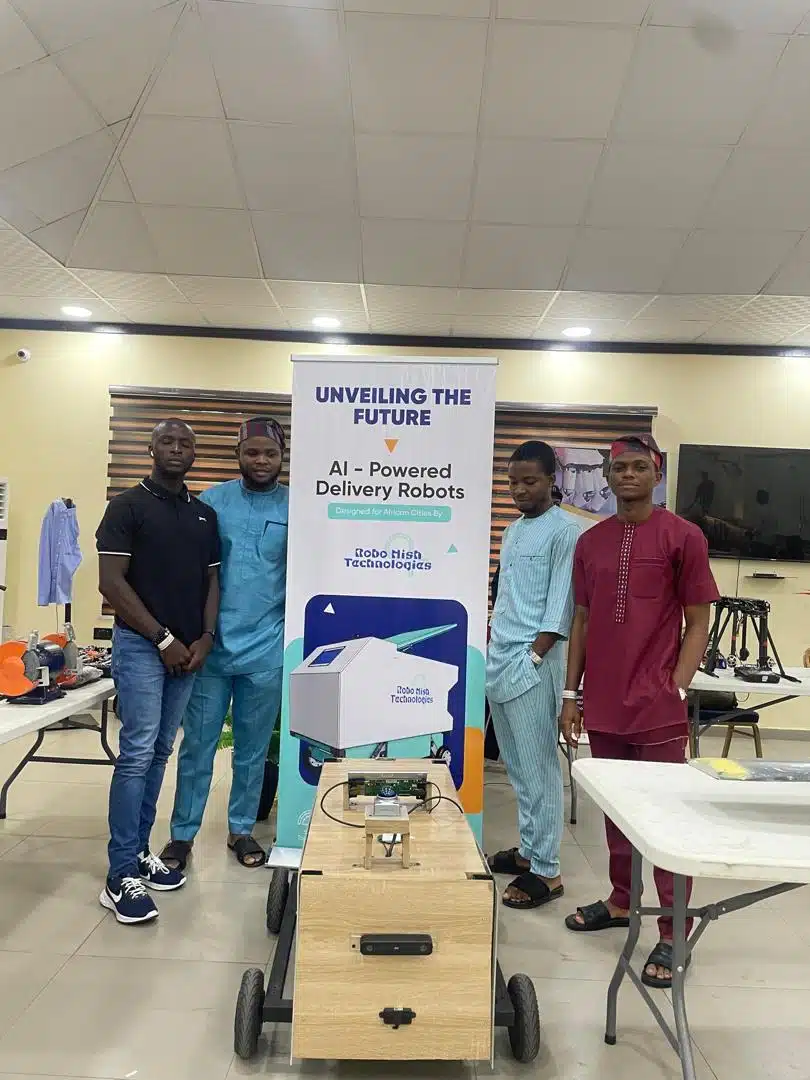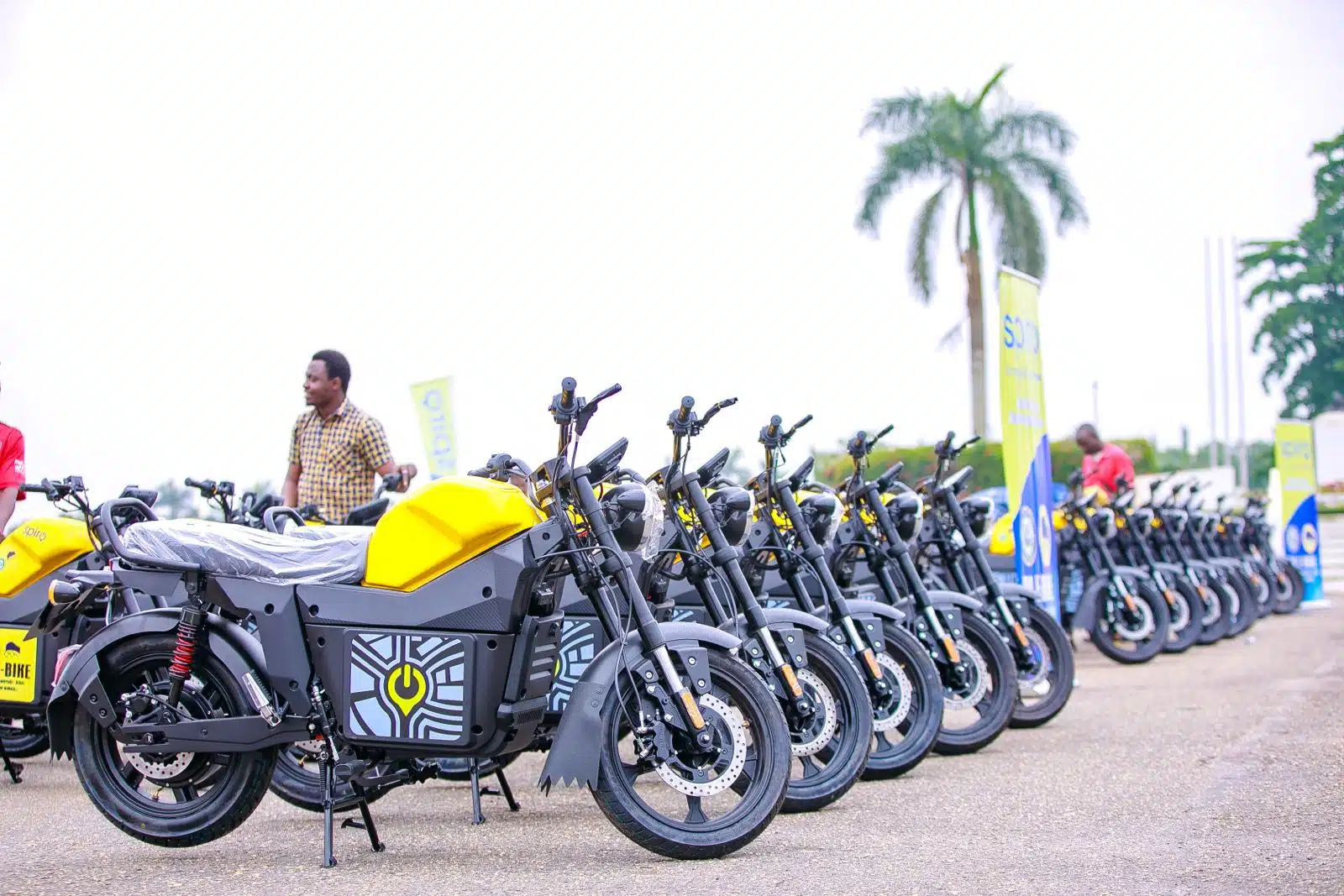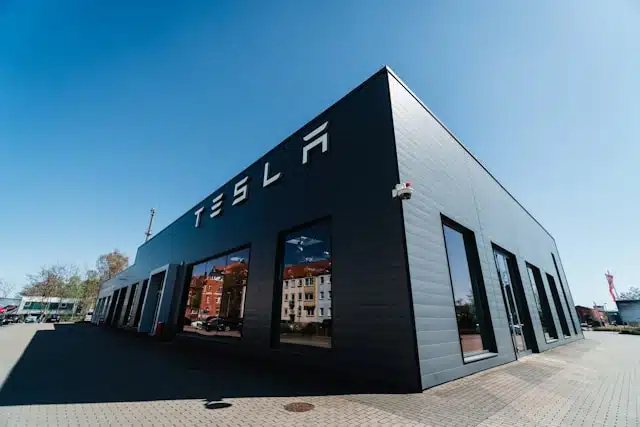After graduating from the University of Lagos (UNILAG) in 2019 with a degree in mechanical engineering, Sultan Sunmola and his friend, Olusanya Ifedayo, decided to travel to the US to further their education.
Sunmola attended INSEAD Business School in San Francisco, while Ifedayo enrolled at New York University (NYU), New York, to study mechanical engineering.
Their experiences during this period influenced their decision to found Robo Nish Technologies, a technology company that specialises in unmanned mobility.
According to Sunmola, “We compared our experiences in our local communities with those in graduate school across different parts of the world — namely America, Europe, and Asia — and we found that one thing consistently stood out: multimodality. The interdependence of various forms of transport. This is something that is missing at home.”
Sunmola believes that Nigerians, and Africans more broadly, should have affordable options for moving people and goods.
While in the US, he once used a self-driving car in San Francisco. On a call with Techpoint Africa, he described it as “a very intriguing experience.”
By 2022, Sunmola and Ifedayo wanted to bring that experience to Nigeria.
“We started thinking about how best we could shape this narrative such that we have various forms of transport and people are not just restricted to a few options.”
They conceived the idea of an AI-powered robot that could deliver packages within gated communities such as university campuses and residential estates.

Victoria Fakiya – Senior Writer
Techpoint Digest
Stop struggling to find your tech career path
Discover in-demand tech skills and build a standout portfolio in this FREE 5-day email course
While this may sound futuristic — like a scene from a sci-fi movie — the business case for a delivery robot in Nigeria might seem difficult to justify. But Sunmola and Ifedayo believe they are building a viable product under Robo Nish Technologies.
They shared how they built the AI-powered robot and outlined their path to monetisation, and it appears they might be onto something.
Building the delivery robot
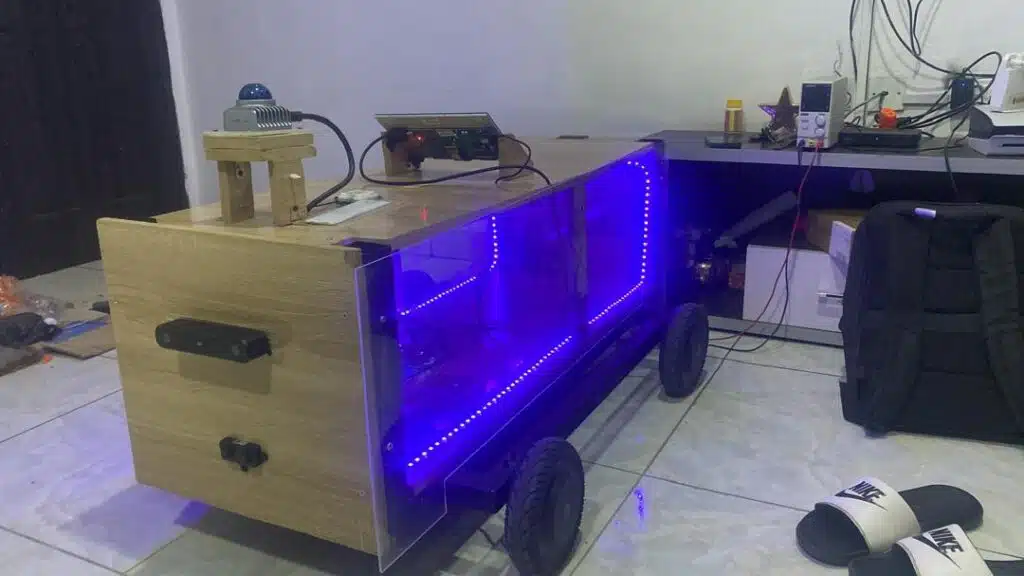
Sunmola and Ifedayo hold mechanical engineering degrees from UNILAG. Ifedayo went on to earn a master’s in the same field, while Sunmola pursued a business degree at INSEAD Business School.
These qualifications were crucial for developing their AI-powered robot. However, building a business around it required a different skill set, which led them to bring on Vanessa Obi, who holds a Master’s of Law from Queen Mary University of London, UK.
While the fancy degrees helped, setting out to build a fully autonomous robot capable of navigating to a delivery location was no simple task.
“It was a very painful journey,” said Sunmola. “We discovered why most people avoid hardware. It’s a very expensive learning curve.”
This steep learning curve has proven to be a major challenge for many startups. For instance, Kifta Technologies reportedly spent $450,000 building its first unmanned vehicle prototype.
Sunmola did not disclose how much they spent developing their delivery robot, but emphasised that it was not easy.
They adopted what he described as a tiered-stage approach to arrive at their current prototype, which is now in use at Nicon Town Estate, Lekki, Lagos.
“We started with a mini version — something that could move autonomously from point A to point B, without yet being able to deliver packages. It could avoid obstacles and navigate to its destination.”
Once they succeeded, they developed a prototype that can be described as a cuboid on wheels, designed to navigate more difficult terrain and avoid complex obstacles.
Next-level obstacle avoidance system
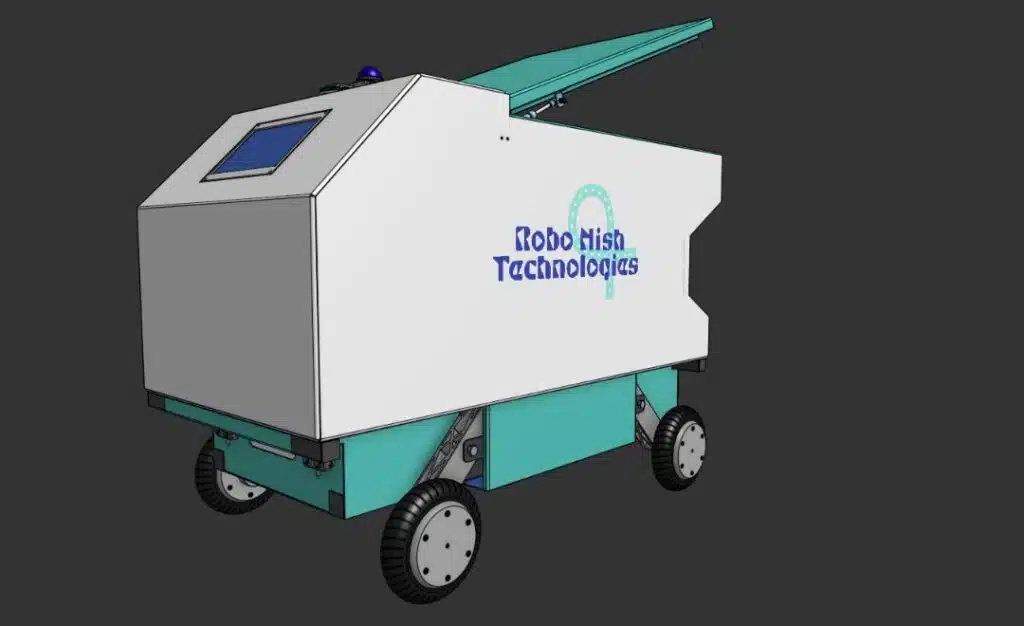
Sunmola is particularly proud of the obstacle avoidance system. “It runs on the latest autonomy stack rating — Level Four; you won’t find better autonomy stack technology anywhere in the world.”
The Society of Automotive Engineers (SAE) generally rates vehicle autonomy from Level 0 to Level 5. Level 0 means no automation — humans perform all tasks.
Levels 1 and 2 introduce partial assists like cruise control or lane-keeping but still require full human supervision. At Level 3, the system can operate independently in certain conditions but expects human intervention when necessary.
Level 4 autonomy, however, marks a major leap — the vehicle or robot can operate entirely on its own within defined environments, without human input. Level 5 would mean total autonomy in any environment, under any condition — something no company in the world has fully achieved.
Given this context, reaching Level 4 autonomy is a remarkable technical feat, especially for a young startup operating in Nigeria’s unpredictable environments.
While Level 4 is generally easier to implement in controlled environments — like Robo Nish’s target campuses and estates — it still demands advanced AI navigation, sophisticated obstacle avoidance, and redundant safety systems.
Companies like Waymo and Cruise in the US have spent billions reaching this level on public roads.
If Sunmola’s team has indeed built and deployed a functioning Level 4 autonomous robot using local engineering talent and limited resources, it is a significant achievement — and a strong indicator of the rising sophistication of African tech innovation.
How it works

Robo Nish Technologies’ delivery robot is designed to operate within gated estates, campuses, or other private premises. Here’s how a delivery would work in theory.
The item is loaded into the robot’s secure compartment when it gets to the estate gate, and the robot autonomously navigates to the customer’s residence using a combination of cameras, sensors, GPS, and AI-based pathfinding.
When it arrives, the customer receives a notification and unlocks the robot using a PIN or Face ID, retrieves the package, and the robot returns to base or moves on to its next task.
While the solution sounds interesting, it tends to duplicate the delivery process customers have already undergone. For instance, after ordering and tracking food from a food delivery platform, the estate resident must repeat the same process when the food arrives at the estate gate.
Sometimes, delivery men complete deliveries inside the estate or campus.
However, Sunmola believes these communities prioritise safety, and Robo Nish’s delivery robot upholds that safety.
“Having third-party logistics providers access these places comes off as a huge security risk.”
From getting access codes to the multiple calls delivery men have to make to enter an estate, Sunmola believes the delivery robot provides residents speed and convenience.
In a demo video, the delivery robot found its way through the finely paved roads of Nicon Town Estate, Lekki, Lagos. Driving past expensive houses and cars parked in the driveways, the delivery robot is safe in its pilot estate.
However, what happens in a less secure community?
Even in developed countries, delivery robots have faced significant safety challenges, not from traffic but from humans. In the US, companies like Starship and Kiwibot have deployed autonomous delivery robots on college campuses and city sidewalks, only to watch them get kicked over, spray-painted, or even stolen.
This becomes even more pressing in a country like Nigeria, where security and respect for shared property can be nonexistent.
Sunmola is aware of this risk. “We’re not naive,” he said. “Even in some estates, the residents themselves may try to test the robot’s limits or mess with it for fun.”
Robo Nish’s robot is equipped with cameras and real-time monitoring to prevent tampering, so any form of assault can be recorded and flagged. If someone tries to open it forcefully or divert it from its path, an alert is sent to the control centre, and the robot stops moving.
Plans also exist to build a reputation scoring system for estates, which means the robot may refuse to serve locations with repeated issues.
But Sunmola admits it’s not foolproof. “At the end of the day, you can’t stop someone determined to destroy something,” he said. “What we can do is make it less convenient to tamper with and more traceable.” The real challenge, he argues, isn’t just building safe tech — it’s creating a culture of respect around it.
Can it make money?
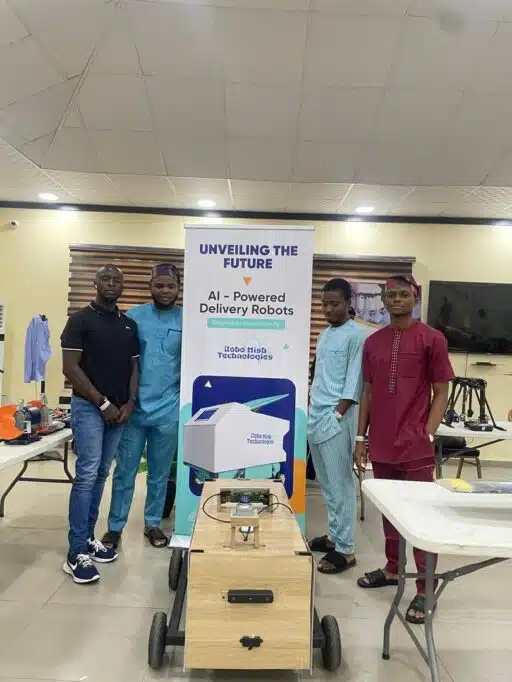
Robo Nish Technologies isn’t just trying to build fancy robots for fun — it’s trying to build a business. But Sunmola is the first to admit that monetising something as experimental as a delivery robot in Nigeria is complicated.
“We’re still figuring it out,” he said. For now, the plan is to work directly with gated communities and residential estates by offering robot deliveries as a subscription-based service.
Residents or estate managers can pay a monthly or annual fee to use the robot for intra-estate deliveries — from dispatching food to sharing documents between neighbours. It’s not a consumer-first model like Jumia or Glovo; it’s infrastructure for a hyperlocal logistics player that doesn’t exist yet.
However, the economics are still fuzzy. Who pays for what? How does pricing scale? Will it be per delivery or bundled? Sunmola said they are testing different models in pilot estates.
One version has estate associations subsidising the robot, while another allows individuals to book delivery trips via an app. “We’re learning which one residents actually find valuable enough to pay for,” he said.
There’s also the possibility of licensing the robot’s hardware and software to security companies or logistics providers. For example, Chowdeck could buy and brand hundreds of delivery robots from Robo Nish and reduce the human involvement in their delivery process.
However, scaling the model outside a few test estates requires much more than curiosity —it requires cash.
That’s where fundraising comes in. Sunmola said the company is actively seeking funding from investors interested in robotics, African logistics, or smart infrastructure.
“We don’t just want money; we want the right kind of partners,” he said. If they succeed, Robo Nish hopes to use the funds to improve the robot’s design, integrate better autonomy software, and expand into more estates across Lagos and Abuja.
The startup plans to set up a small production lab in Nigeria to build and iterate on their bots locally.
But fundraising hasn’t been easy. Robotics doesn’t have the same appeal as fintech, and many local investors remain sceptical. Still, Sunmola is bullish.
“Someone has to take the risk,” he said. “If we don’t build it, we’ll be stuck waiting for someone else to do it for us.”

